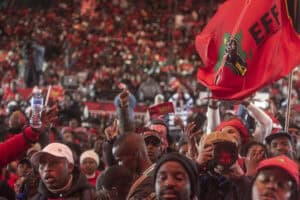Muhammad Yunus calls for calm and rebuilding as he prepares to lead Bangladesh's interim government.

Bangladesh’s Muhammad Yunus, who is set to lead a caretaker government after mass protests ousted the premier, called on compatriots Wednesday to be “ready to build the country”, ahead of his hugely anticipated return.
The Nobel-winning microfinance pioneer will head the interim government after longtime and autocratic prime minister Sheikh Hasina fled the country, the presidency has said.
“Be calm and get ready to build the country,” Yunus said Wednesday in a statement, a day ahead of his expected return to the country from France, urging calm after weeks of violence in which at least 455 people were killed.
“If we take the path of violence everything will be destroyed,” he added.
The appointment came quickly after student leaders called on the 84-year-old Yunus — credited with lifting millions out of poverty in the South Asian country — to lead.
ALSO READ: India ‘deeply concerned’ at Bangladesh crisis – foreign minister
The decision was made in a meeting with President Mohammed Shahabuddin, the heads of the army, navy and air force, and student leaders, the president’s office said in a statement.
Yunus will have the title of chief adviser, according to Nahid Islam, one of the leaders of Students Against Discrimination who participated in the meeting.
Shahabuddin agreed that the interim government “will be formed within the shortest time” possible, Islam told reporters, describing the meeting as “fruitful”.
A Bangladesh court on Wednesday acquitted Yunus of a labour conviction on appeal, his lawyer Khaja Tanvir Ahmed told AFP.
Yunus had travelled abroad earlier this year after he was sentenced to six months in jail for the labour charge — but was immediately bailed pending appeal.
ALSO READ: Bangladesh’s prime minister resigns, forced to flee
The case was criticised as politically motivated by watchdogs including Amnesty International.
‘Victory’
There are few other details about the planned government, including the role of the military, but Yunus has said he wants to hold elections “within a few” months.
“I congratulate the brave students who took the lead in making our Second Victory Day possible, and to the people for giving your total support to them,” Yunus added.
“Let us make the best use of our new victory. Let us not let this slip away because of our mistakes.”
Hasina, 76, who had been in power since 2009, resigned on Monday as hundreds of thousands of people flooded the streets of Dhaka demanding she stand down.
ALSO READ: Bangladesh clashes: Death toll hits 300 amid escalating protests
Monday’s events were the culmination of more than a month of unrest, which began as protests against a plan for quotas in government jobs but morphed into an anti-Hasina movement.
Hasina, who was accused of rigging January elections and widespread human rights abuses, deployed security forces to quash the protests.
‘Stop the violence’
Hundreds of people were killed in the crackdown, but the military turned against Hasina on the weekend and she was forced to flee in a helicopter to neighbouring India.
Army chief General Waker-Uz-Zaman said on Sunday it was “time to stop the violence”.
The military has since acceded to a range of other demands from the student leaders, aside from Yunus’s appointment.
ALSO READ: 100 injured as Bangladesh student groups clash over job quotas
The president dissolved parliament on Tuesday, another demand of the student leaders and the former opposition Bangladesh National Party (BNP).
The head of the police force, which protesters have blamed for leading Hasina’s crackdown, was sacked on Tuesday, the president’s office said in the statement announcing Yunus as leader.
Ex-prime minister and BNP chairperson Khaleda Zia, 78, was also released from years of house arrest, a presidential statement and her party said.
Political prisoners have been released, including Michael Chakma, an Indigenous activist incarcerated in a secret prison since 2019, his United People’s Democratic Front party said on Wednesday.
And the military reshuffled several generals, demoting some seen as close to Hasina, and sacking Ziaul Ahsan, a commander of the feared Rapid Action Battalion paramilitary force.
ALSO READ: Bangladesh suspends job quotas after student protests
Free from ‘dictatorship’
Since Tuesday, streets in the capital have been largely peaceful — with shops opening and international flights resuming at Dhaka airport — but government offices remained mostly closed.
Millions of Bangladeshis had flooded the streets to celebrate after Hasina’s departure — and jubilant crowds also looted her official residence.
“We have been freed from a dictatorship,” said Sazid Ahnaf, 21, comparing the events to the independence war that split the nation from Pakistan more than five decades ago.
Police said mobs had launched revenge attacks on Hasina’s allies and their own officers, and also freed more than 500 inmates from a prison.
Monday was the deadliest day since protests began, with at least 455 people killed since early July, according to an AFP tally based on police, government officials and hospital doctors.
ALSO READ: Landslides kill nine as Bangladesh lashed by rain
Protesters broke into parliament and torched TV stations. Others smashed statues of Hasina’s father, Sheikh Mujibur Rahman, Bangladesh’s independence hero.
Some businesses and homes owned by Hindus — a group seen by some in the Muslim-majority nation as close to Hasina — were also attacked.
Bangladeshi rights groups, as well as US and European Union diplomats, have expressed concerns about reports of attacks on religious, ethnic and other minority groups.
Neighbouring India and China, both key regional allies of Bangladesh, have called for calm.
– By: © Agence France-Presse






